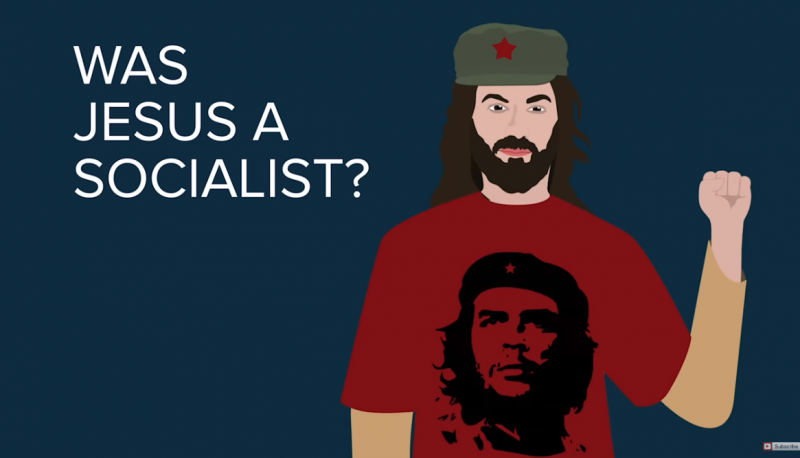A video published today by conservative columnist Dennis Prager’s digital operation PragerU relies on David Barton-esque understandings of Biblical text to argue that Jesus Christ was an ardent advocate of free market capitalism, despite the fact that capitalism was not conceptualized until centuries after the events in the Bible are said to have taken place.
Lawrence Reed, who was apparently still president of the libertarian Foundation for Economic Education during the filming of a video uploaded to PragerU’s YouTube channel today, attempted to refute arguments that Jesus was sympathetic to an economic and social structure that would resemble socialism. Reed argues that Jesus was instead a free-market capitalist.
“Was Jesus a socialist? Well, if socialism is nothing more than being kind to other people, then you might think the answer is yes. But you can be kind to other people and be a capitalist,” Reed said, going on to cite billionaires who have given large sums of money to various charitable endeavors.
The Religious Right, in lockstep with the GOP, has taken to scaremongering against any and all politicians and policies they disapprove of by calling them socialist and warning that America will experience chaos similar to that playing out in Venezuela if the progressive agenda is allowed to succeed. (Many well-off countries in Europe have similar policies to those bemoaned by Republican figures as “creeping socialism.”)
In the PragerU video, Reed defines socialism to be “the concentration of power into the hands of government elites to achieve the following purposes: central planning of the economy and the radical redistribution of wealth.” Technically, socialism is a political philosophy meant to allocate the means of wealth production and management to collective society to decide.
“Jesus never called for any of that. Nowhere in the New Testament does he advocate for the government to punish the rich—or even to use tax money to help the poor,” Reed said.
Reed goes on to cite Luke 12, in which Jesus declines to instruct a man’s brother to split a family’s inheritance with him, as evidence that Jesus didn’t support socialism. In his retelling, Reed neglects to include the latter part of the passage in which Jesus recounts a story to his disciples meant to discourage them from fixating on and hoarding individual wealth.
Reed goes on to cite Jesus’ “Parable of Talents” to further argue that Jesus supported capitalism. In the Parable of Talents, a wealthy master gives his servants portions of his wealth while he is on a trip. One servant who sought to protect his master’s wealth by burying it for safekeeping is punished for not generating more wealth for his master. The servants who used their master’s money to reap a profit were promised to be rewarded, although it is worth noting the wealth they generated was not their own.
Reed continues to wax on biblical tales about Jesus expelling moneychangers from a house of worship, a story of a good Samaritan helping a beaten person on the road, and Jesus’ remark that it is hard for a rich man to enter the kingdom of heaven, to assert that Jesus was a supporter of capitalism. He goes on to twist other remarks in scripture to suggest that Jesus “supported free markets.”
Jesus’ “Parable of the Workers in the Vineyard” is cited by Reed as one example of Jesus supporting capitalism. The actual point of Jesus’ telling of the parable is the lesson that no matter who seeks God’s salvation, regardless of who they are and no matter how late they are in their lives, will receive the same reward: entering heaven.
Nevertheless, Reed said of the parable, “That’s a testament to the principles of supply and demand, of private property, and of voluntary contracts, not socialism.”
“Most importantly, Jesus cared about helping the less fortunate. He never would have approved anything that undermines wealth creation and the only thing that has ever created wealth and lifted masses of people out of poverty is free market capitalism,” Reed said.







